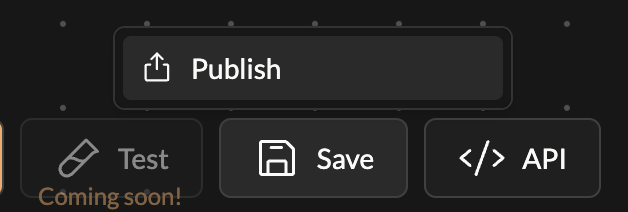Saving and Versioning Workflows
This page will teach you how to publish, update and version your workflows.
Concepts
Here are the key concepts for managing your workflows:
Workflow Versions
A workflow version is a point-in-time snapshot of your workflow's configuration. Each workflow can have multiple versions that you can manage independently. This versioning system lets you:
- Track changes over time
- Roll back to previous versions if needed
- Maintain different variants of the same workflow
Public vs Private Workflows
- Private Workflows: Only visible to you
- Public Workflows: Available to everyone
- Publish Workflows: Available to everyone through the marketplace
- Can be viewed and used by any user
- Can be forked (copied) by others
- Great for sharing reusable workflows with the community
Forking Workflows
When you fork a workflow from the marketplace, you create your own copy of that workflow. This allows you to:
- Customize the workflow for your specific needs
- Make changes without affecting the original
- Have full ownership of your copy
Workflow States
Workflows exist in one of four states:
- Draft: New and forked workflows start here. Also every workflow can have a draft with unsaved changes.
- Private: Workflows that no other user can use it
- Public: Workflows that can be used by others
- Published: Workflows that can be used by others and are accessible through the marketplace
Each state determines how you can save and modify the workflow.
Draft

Draft workflows are new workflows or forks from the marketplace. Also every workflow can have a draft with unsaved changes. In this state, you can:
- Edit components, inputs, and outputs
- Configure workflow settings
- Publish the workflow to make it executable
To publish, click the 'Save' button and provide:
- Name and description
- Icon
- Privacy setting (public/private)
Once published, the workflow moves to the 'Published' state.
Shared

A shared workflow is a workflow that is public or published. If it is created by someone else, and you are editing it in the workflow editor, since you don't own it, you can:
- View and test the workflow
- Fork it to create your own draft version
- Publish your fork as a new workflow
- Create a draft version for that workflow. Only you can see your draft version.
Deleting a workflow

To delete a workflow, you need to go to the Dashboard, and click on the three dots on the right side of the workflow you want to delete. To be able to delete a workflow, you need to be the owner of the workflow.